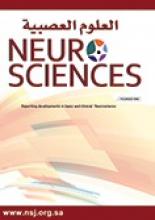Abstract
OBJECTIVE: Developmental and behavioral (DB) disorders are commonly encountered in the general pediatric and neurology practices. There is a strong demand for trained developmental pediatricians and child psychiatrists in our region. In this study, we aimed to study practitioner’s experiences in dealing with these disorders and their referral practices.
METHODS: Attendees of an international pediatric symposium on neuro-developmental and behavioral disorders were included. The symposium was conducted by the Department of Neurosciences, King Faisal Specialist Hospital and Research Center in Jeddah from 4-6th March, 2003. A structured 25-item questionnaire was designed to examine their demographics, training, practice and referral patterns.
RESULTS: A total of 167 attendees registered for the symposium and 131 (78%) questionnaires were returned. Participant’s ages were 23-69 years (mean 36, SD 8.5), with 67% being females. Many participants were practicing general pediatrics (43.5%) and the majority (92%) frequently saw and followed children with DB disorders. However, only 24% felt highly confident in their management. As well, only 35% and 31% of physicians received structured developmental and psychiatry rotations, during their training. Those who received a structured developmental rotation felt more comfortable in making the correct diagnosis (odds ratio (OR) 4, 95% confidence interval (CI) 1.2-14, p=0.01) and in providing appropriate treatment (OR 3.8, 95% CI 1.4-11, p=0.006). Many participants (32%) had no direct access to a developmental pediatrician or child psychiatrist for referrals.
CONCLUSION: Developmental and behavioral disorders are common in daily pediatric practice. Most practitioners did not receive a structured rotation covering these disorders during their training and were not highly confident in managing affected children. Given the limited number of developmental pediatricians and child psychiatrists, we highly recommend appropriate developmental and psychiatric training for practitioners.
- Copyright: © Neurosciences
Neurosciences is an Open Access journal and articles published are distributed under the terms of the Creative Commons Attribution-NonCommercial License (CC BY-NC). Readers may copy, distribute, and display the work for non-commercial purposes with the proper citation of the original work.






